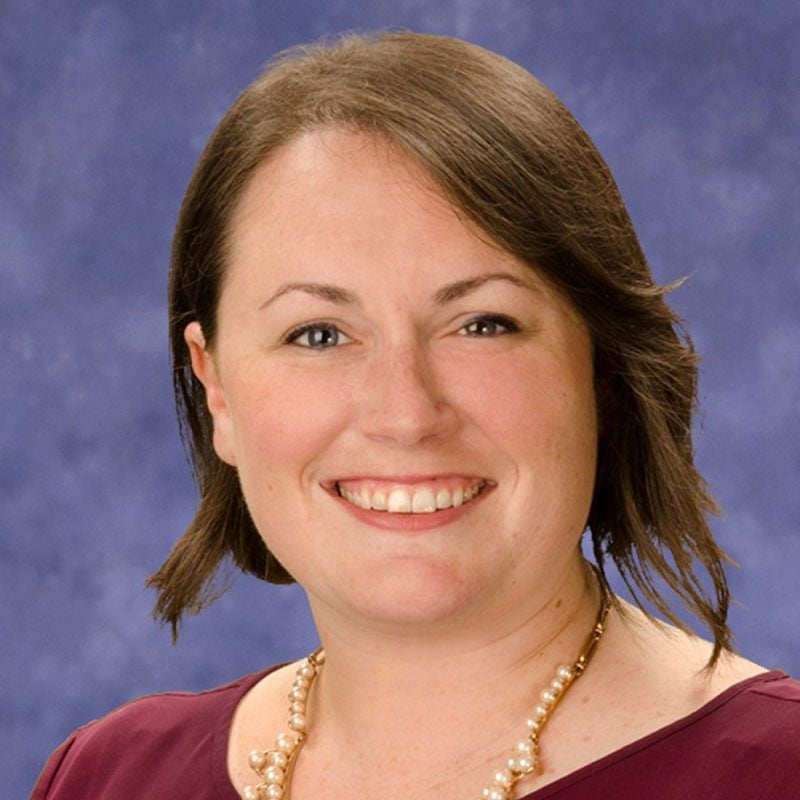
Anna Dauer '08
Palliative Care Physician, Deaconess Hospital
See Professional Activities
How did you find your way to where you are today? Share a little about your professional journey.
From a busy life in Kentucky, to a world of opportunity and engaged education at Furman University, I was sure I was prepared for a life practicing medicine. A strong background in humanities and science fueled my passion to combine evidence-based practice and person-centered care. After medical school, I pursued a residency in Internal Medicine. Caring for beleaguered and critically ill patients with families who were caught up in the cogs of the machine of hospitalized care ultimately led me to complete a fellowship in Hospice and Palliative Medicine. Now I work with a team of professionals to care for patients in the hospital who have serious illness and distressing symptoms or change in their condition that warrants a conversation about how to best proceed.
What inspires you?
My family’s focus on education and humanism inspired me throughout my training. Courses at Furman in philosophy and sociology of medicine anchored in me a focus on the meaning of life and medicine and ethical considerations that arise daily for patients and families in the medical world.
When providing advice for professional development, what are some tools or resources one should consider?
Naturally rigorous science and premedical preparation is necessary for pursuing a career in health care, especially as a clinician. But I also recommend reading Atul Gawande’s Being Mortal, Tracy Kidder’s Mountains Beyond Mountains, and even the controversial piece by Zeke Emanuel, “Why I Hope to Die at 75.” Developing a sense of the privilege of practicing medicine while also maintaining your humanity in the face of fatigue, long work hours, and inevitable failures is critical to succeeding as a physician.
How would you recommend someone interested in the same career/vocation pursue a similar path?
Typically, it is recommended to pursue medical school directly out of college, but some of my most successful peers had additional education or work experience that shaped their experience and strengthened their skills as a resilient, compassionate physician. Follow your passions when timing medical education, location, and focus for specialty or subspecialty.
How have mentors impacted your professional development? How did you develop those relationship?
Mentors, advisors, and confidants are requisites for a focused and robust career in medicine. This is a team-based field that certainly requires individual learning and dedication, but developing relationships formally or informally will sustain and inspire you – and may even get you a job or a position in the next level of training you are pursuing.
What do you wish you would have known getting started in your field?
I wish I had known the years will fly by, but some days drag, and it is important to maintain your engagement and focus to achieve a worthy goal while still being gentle with yourself, maintaining your humanity, and taking time to live your life you have it. I heard about the rigorous hours and the time commitment, but in the midst of it, while your peers are settling into their first jobs or careers, renting or buying apartments or homes, saving for retirement and enjoying their 20s and 30s, pursuing a career in medicine can feel like that time is stolen. I am honored and grateful to be finished with training and pursuing a career in an inspiring and rewarding field, but considering where and how to pursue it may be important when balancing other life priorities.
What additional education or certification is required/recommended?
After medical school, completing a residency of three to five or more years is required and generally fellowships of one to three or more years follow, depending on your specialization. Options to complete additional degrees like a masters of bioethics, masters of business administration, or a PhD can lengthen that process as well, while lending you other strengths and skills for your career after completing training.
How has your liberal arts background shaped your career path or supported your success?
Maintaining an interest in a diverse set of topics and ideas as well as the ability to critically analyze different source materials and balance a busy life, all gleaned from my experience at Furman, have been invaluable in my career as a physician. A liberal arts background at Furman echoed throughout my education and led me back to this focus on palliative medicine, with complex end-of-life issues, ethical conflicts between patients and families or health care providers, and skilled communication in intense settings like critical care units in the hospital.
What was your major? And how have you applied it in your career field?
As a history major, I have a deep appreciation for not only the recent history of my patients’ medical backgrounds and psychosocial attributes that impact their care and their wishes, but an overall understanding of the human condition. Of particular interest is the history of medicine and its exponential growth and change with advancing technology and research. My background in studying history as an undergraduate still impacts my focus and passion in my career as a palliative care physician.
0